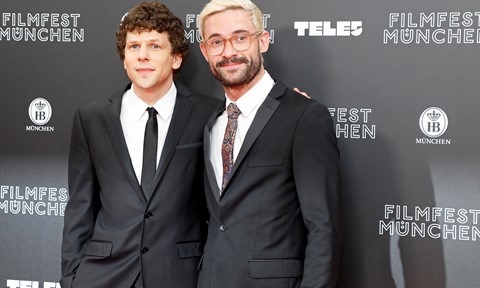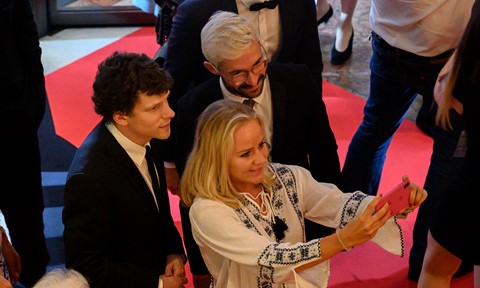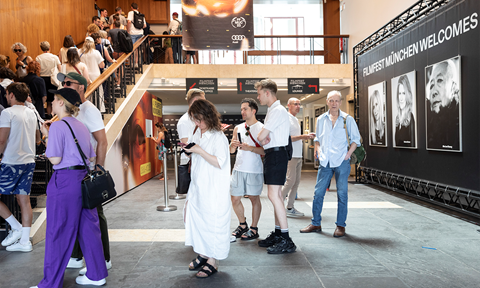INTERVIEW: "IT FELT LIKE EVERY ELEMENT WAS PERFECT"


Yesterday the 37th FILMFEST MÜNCHEN started with a bang: In THE ART OF SELF-DEFENSE Jesse Eisenberg plays a timid man without any self-confidence who is mugged one night and then starts taking karate lessons. It doesn't take long before he finds success, the accountant with the female sounding name Casey grows more courageous and confident. However, the story takes a surprising turn soon.
The second feature of director and writer Riley Stearns is a brillant and absurd satire on toxic masculinity. Despite all the black humor the film never forgets the tragic nature of its protagonist who, driven by the desire to be acknowledged by others, starts to lose himself. No wonder: Stearns, who is himself proficient in martial arts, processes very personal thoughts here.
The likable pair shares those thoughts in person here in Munich. After having presented the film at the opening, they will open themselves up at their very own FILMMAKERS LIVE! giving insight into the background and development of the film. Those who still crave for more: We met the two before the European premiere of THE ART OF SELF-DEFENSE for an interview.

How did you come up with the idea for the film?
Riley: I was working on an idea that wasn’t really working. I felt like I was trying to fit a square peg into a round hole. So I threw out that idea and thought: Why not do a film about something that I love? So I decided to try to do something about martial arts because I do Jiu Jitsu myself.
How long have you been doing that?
Riley: Six years. I have the purple belt now. Which is halfway point to black belt. Ten years is usually when you get your black belt. It takes a lot but I love it. I train five days a week. When you don’t have a real job you need something to replace that.
Why not do a film about Jiu Jitsu then?
Riley: I picked Karate instead of Jiu Jitsu because people tend to know what that is. And also people rolling around on the ground isn’t as cinematic as people punching and kicking. I felt telling a story in the world of Karate and martial arts might set up people to expect one type of film. And instead I could subvert those expectations and talk about things that I’ve been thinking about particularly thoughts and fears relating to me as a man and society’s expectations towards me as a man.
Jesse, when did you get involved in the film?
Jesse: Timewise I don’t really know.
Riley: I do. You sent me an email on July 6th 2017 and told me you read the script and wanted to be involved.
Jesse: Well, it’s one of the best scripts that I read in my life including films I haven’t been in. So I sent an email.
Riley: I expected a mail that says: I want to talk. Instead you wrote: I want to do that movie.
Jesse: Back then I had a great agent. There was this film I was supposed to shoot three months later. So my agent said, let’s see if we can fit it in right away. Everything happened really quickly.
Riley: The time between the mail of Jesse and the day I started prepping the film in Kentucky was a month and a couple of weeks’ time.

Isn’t that a bit short?
Jesse: It is. Usually it takes about a year to get your things together. The only downside was that castings for the other roles had to be done very quickly. It truncated the other processes. But it was all perfect. I hadn’t had a good movie experience like this in a decade or so. It felt like every element was perfect.
Riley: Even when we had to recast because one actor who was supposed to star in the film dropped out because he had a commitment to a cruise ship with a comedy gig and couldn’t get out of the contract. It’s like everything happened for a reason even though I don’t believe in fate.
Jesse: Sometimes things just happen badly. But here I had the impression that everybody was working on the exact same project. The set design was the exact same movie as the script. Everything felt like it was part of this strange world. Everybody appreciated the movie in his own personal way.
Riley: It felt huge to me. I felt like I wrote something that was just personal to myself. But we ended up with a team that could really relate to the stuff I had to say.
How did you relate to the film when reading the script?
Jesse: The comedy is some of the best comedy you’d see in a sketch comedy even though the tone is very different. Because the movie is so tonally skewed in this unusual way the comedy comes out in a way that doesn’t feel like it’s trying to ingratiate to you.
Riley: Every character is saying exactly what they’re thinking. They could be saying something wildly ridiculous but they say it with conviction. The comedy comes from that conviction and from that earnestness. Casey is like an infant, like a sponge soaking up this information whether it’s good or bad. And a lot of the comedy is just him not knowing who or what to believe. He takes everything at face value.
Jesse: Even though the comedy is so funny and so clever the film never loses sight of the emotion of the character.

How would you describe your character Casey?
Jesse: My character almost thinks like an infant. He is very trusting of other people. He has like a pre-Freudian mindset. He is not employing any psychological tactics of normal socialization. He does not try to charm anybody. He does not try to get something from somebody. He has no ulterior motives. There is a sweet purity to the character. Even though the dialogue is very funny it’s always in service of this very emotional person.
Riley: He just wants to belong. So a lot of it is just him trying to make people like him. Often at the expense of himself. Which is oftentimes how I go about things. I tend to just want people to like me. The character is not literally me. But it’s hard for me to write and not put something from me in that character. Some of it comes out in Casey, for better or for worse.
Jesse: He reminds me of me when I was a kid. I was scared of anything. Assuming everybody was really nice and then punching me in the face. And assuming that if they punch me it’s probably my fault. I shouldn’t have put my face so close to his fist.
Have you actually ever been beaten up?
Riley: Personally I was never in an altercation. I’ve never been mugged. I’ve never been assaulted. But there are always incidences when people are drunk that make me glad that I know what I know now.
But you didn’t get to use this knowledge?
Riley: It’s funny. The more I learn how to fight the less I actually want to fight. When I started I was like: Oh man, I hope I get to use those techniques some day! But the more I know the less I want that to happen. Because now I know how to actually hurt somebody. And I don’t want to do that.
Every character is saying exactly what they’re thinking. They could be saying something wildly ridiculous but they say it with conviction. The comedy comes from that conviction and from that earnestness.
Jesse, did you ever have experiences with martial arts before?
Jesse: I had maybe like five weeks of training when I was eight years old. That was basically required as a Jewish kid in New Jersey. Everybody just does it. That was in the early 90s when these store front Karate things popped up all over the suburbs.
Riley: Right. They called themselves Dojos. But it was really just a place to put children in, give them belts periodically and charge more money as it goes along. Making more of a business out of it. White suburban kids were largely influenced by “Karate Kid” back then. I was five years old when I got to yellow belt. My dad got some free lessons for myself and him for doing some artwork for this one dojo. And once that free lesson period was gone after two months he was like: Well, we’re not doing that anymore. I think every kid gets to yellow belt. That’s why I wanted Casey to get a yellow belt. This iconic image of a man with a yellow belt. Not a black belt, not anything higher. Just a yellow belt, the child’s belt. That’s even more infantile than the white one.
Casey takes these lessons to become what intimidates him. What or who intimidates you?
Riley: We talked about it briefly. One very on the nose thing: I don’t want to get into a fight. The idea of an altercation scares me. But that’s a good fear to have I think. Getting out and being single for the first time in my adult life was incredibly intimidating too. Not feeling like I could talk to people. Being on my own for the first time as an adult. Trying to be social. I was kind of intimidated by that and would often withdraw and stay in my place instead.
What about you?
Jesse: Tonight we’re presenting the film to 1,200 people. That’s incredibly intimidating. Were you nervous when you showed it in Texas?
Riley: No. Because the very first screening we ever did was a test screening of about 200 people in New York and the audience reacted in a way that was very positive. Going into something that’s comedic and you don’t know whether people will be laughing, that’s intimidating. But since we had that test screening the premiere in Texas was fine. There’s always a moment at the end of the film where there is applause, in any screening so far.
Jesse: Which one?
Riley: The showdown. It’s incredible really. Hopefully it will happen again tonight. But’s it’s a new country. That’s the most intimidating aspect of the screening tonight. This is a new frontier.


